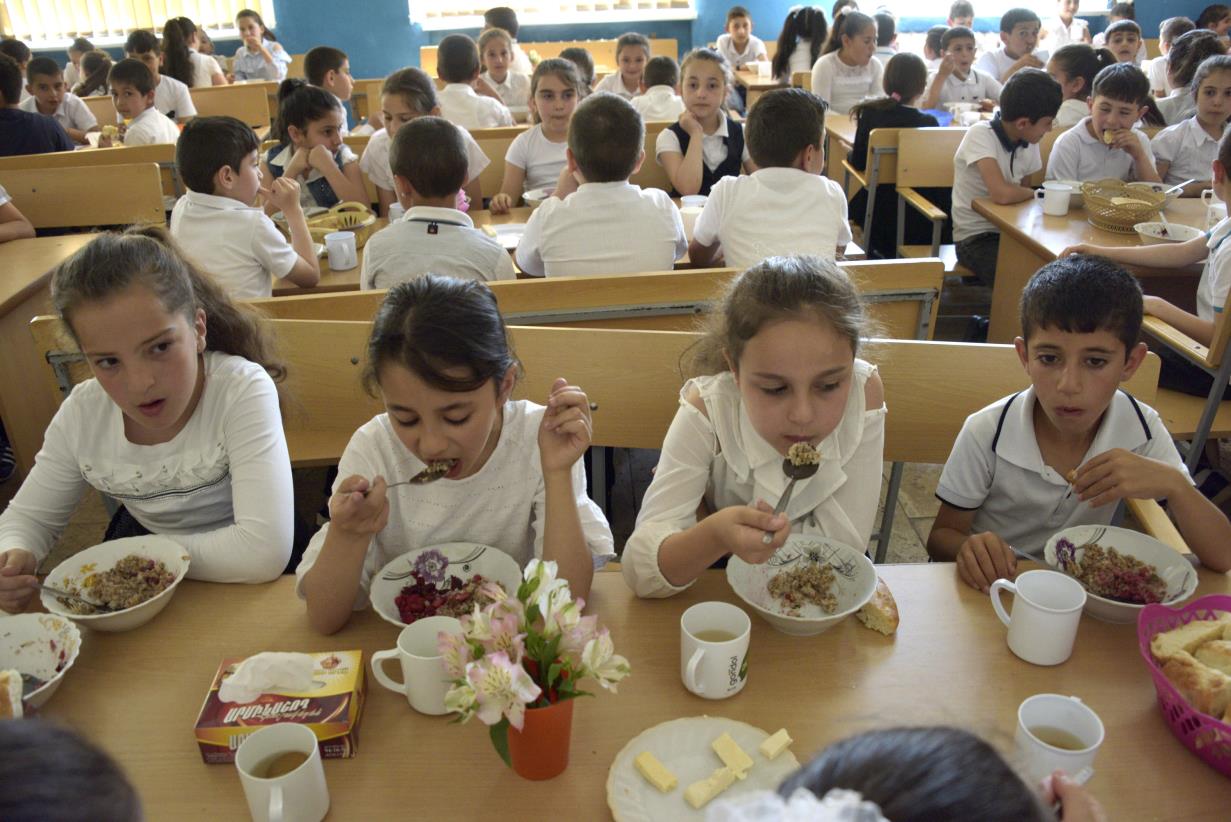New Handbook for Parliamentarians - practical guidance on transforming food systems and improving nutrition
Produced by the Inter-Parliamentary Union and FAO, the publication seeks to support legislative processes to promote healthy diets for all

Pupils having lunch at a school in Armenia that benefits from an FAO food security and nutrition project funded by the Russian Federation. The new Handbook stresses that access to food alone is not enough; people need nourishment from healthy diets.
©Photo: ©FAO/Karen Minasyan / FAO
19 April 2021, Geneva/Rome - Aimed at providing lawmakers with practical guidance on legislative processes that prioritize nutrition, the Inter-Parliamentary Union (IPU) in partnership with the Food and Agriculture Organization of the United Nations (FAO), published today a new Handbook for Parliamentarians, entitled "Food Systems and Nutrition".
The online Handbook was produced in collaboration with the Scaling-Up Nutrition (SUN) Movement, the World Health Organization (WHO), the United Nations Children's Fund (UNICEF) and the African Union Development Agency's New Partnership for Africa's Development (AUDA-NEPAD).
One out of three people globally suffers from at least one form of malnutrition, and the economic loss attributable to poor nutrition is estimated at $3.5 trillion per year. Recent research on the worldwide burden of disease has found that a suboptimal diet is responsible for more deaths than any other risk. Every country in the world is affected by one or more forms of malnutrition. Being one of the major global multi-sectoral issues, it is crucial that it be addressed by the world's parliaments.
Writing in the Handbook's foreword, FAO Director-General, QU Dongyu, and IPU Secretary General, Martin Chungong, noted how the COVID-19 pandemic had highlighted the weakness of our food systems. "Governments should take advantage of this unfortunate crisis to establish coordination and other measures and mechanisms to stabilize and restore food availability, accessibility and affordability for all people, especially the most vulnerable, to ensure their food security and nutrition, during and after the pandemic".
This is where parliaments play "a crucial role," they noted. "Parliamentary action is fundamental to securing the right to adequate food for all. Parliamentarians guide and oversee public-sector policies and budget allocations towards transforming food systems that deliver healthy diets for all."
After decades of steady decline, since 2014 the percentage of people who are undernourished globally, has been on the rise. In 2019 this reached 8.9 percent of the world's population, or nearly 690 million people. Worldwide, 144 million children under the age of five years are stunted (low height for age), 47 million children are wasted (low weight for height), and the prevalence of anaemia among women of reproductive age is 32.8 percent of the world's women. This situation creates a major barrier to achieving the UN's Sustainable Development Goals by 2030.
It is emphasized in the Handbook that access to food alone is not enough; people need nourishment from healthy diets. Delivering such healthy diets requires a holistic approach that supports diets made up of foods that promote all dimensions of individuals' health and well-being. This approach must incorporate the entire food system - food production, processing, distributing, marketing, supplying, eating and disposal. Every aspect of the food system must align to support good nutrition; single interventions in isolation will likely have limited impact.
Parliamentarians can play a major role in improving food systems in their respective countries, and the Handbook identifies entry points for parliamentary interventions. Recommended actions are described in these entry points using existing case studies, which cover the following four areas:
1. Representation. Parliamentarians must stay engaged with their constituents to know their needs and to advocate for their welfare. They can collaborate with advocacy groups and international organizations to stay informed of the pressing issues related to nutrition and food systems.
2. Legislation. Parliamentarians should be fully aware of, but not be deterred by, the complex causes leading to all forms of malnutrition. Enacting appropriate laws should be prioritized as determined by the level of need, the scale and scope of problems, and cost-effectiveness.
3. Budget. There are multiple steps in the budget cycle - planning, negotiation, spending, and review - at which Parliaments and Parliamentarians can place nutrition and food systems foremost in budget-related decisions.
4. Oversight. Parliamentarians can establish clear oversight processes by which to ensure that appropriate resources are provided to implement nutrition-related programmes, assess the impact and identify unintended negative effects on nutrition of government policies and actions in all sectors, and monitor progress towards meeting national and international commitments.
The Hanbook is currently available in English, French and Spanish.
Contact
FAO News and Media (+39) 06 570 53625 [email protected]
